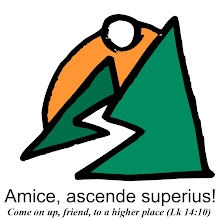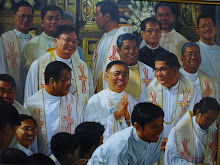Introduction
Life, in general, is never a clearly defined, mono-polar reality that can be neatly described in one-sided and absolutist terms. Like all of reality, it is seldom, if ever, an “either/or” but a “both/and” experience. Priestly life, in all its natural and supernatural richness, and religious life, in all its multi-faceted nature, both share in this bi-polar, and at the same time, unitary nature of all reality in this world.
This paradoxical, multi-faceted nature of reality is partly what this series of reflections on the priesthood and religious life is all about. Given the breadth and the depth of their essentially mysterious nature that one can only hope to approximate, situated as priesthood and religious life are in a world that daily grapples with ever increasing complexity that can never be fully encapsulated in neat and categorical statements, these reflections are an attempt – my own, first of all, as a priest and religious myself – to articulate my own - without doubt, feeble and sorely deficient and partial – understanding of the mystery that both states of life are for me and for other priests and religious like me.
These reflections were born out of necessity. Although I have been lecturing on Moral Theology for at least 14 years now, the theology of the priesthood and religious life has never been my special focus and interest all through this time. An invitation, accepted willingly, I must say, from a religious congregation of men, sort of forced me to do this series of reflections, for which as the reader can easily see, I have liberally sought inspiration from luminaries and persons whose brilliance of mind and spirit, I can only hope to emulate.
All reflections, except the eleventh and the last, follow the same format. Two seemingly irreconcilable poles are presented by every title. In all sub-titles, I suggest a possible resolution and integration of both poles. In all reflections, I have been guided by the multi-faceted nature of all reality I have just referred to, priesthood and religious life included. I refer to a series of tensions that priesthood and religious life are faced with. In this regard, Tillich, as explained by Cozzens, is my model and mentor. Sermons, he reportedly once wrote, “first need to address the ambiguity, pain, and privilege of the human condition.”
In the first ten reflections, what I modestly propose to my readers is essentially a glimpse of some of what, at least for me, are salient elements of the existential human and earthly condition faced by the priest and religious in our days, more precisely, the “ambiguities” and the “pains.” But I also would like to refer to the endless possibility, or “privilege” born of grace from above, that is inherent to this mysterious supernatural call and gift from God that priestly and religious vocation is, that makes it possible for weak men that all priests and religious are, of becoming what the Lord, in His wisdom and mercy, has originally intended them to be.
In the following pages, therefore, my modest aim is to offer, with a great deal of help from other more capable authors and theologians, my own contribution towards helping myself and others to find meaning in our priesthood and religious life, situated though it is (like it always had been), in a world of tension, of polarities, of ambiguities, and of pains.
But I would like also, in the same vein, to claim the privilege and the promise attached to that capacity for meaning-making that is the hallmark of our unworthy participation in the priesthood, prophethood, and kingship of Christ.
Thus, in the last reflection, I lay claim to that gift of hope that comes with faith in the power of the Spirit, who, ultimately, enables us priests and religious to face the darkness both in the present and the future with that same love and courage shown by no less than Christ, the one, true, High Priest. I make a plea to my brother priests and fellow religious, to go on believing and belonging, and to allow our priestly and religious life to become at one and the same time, a journey and a message of hope for all.


No comments:
Post a Comment